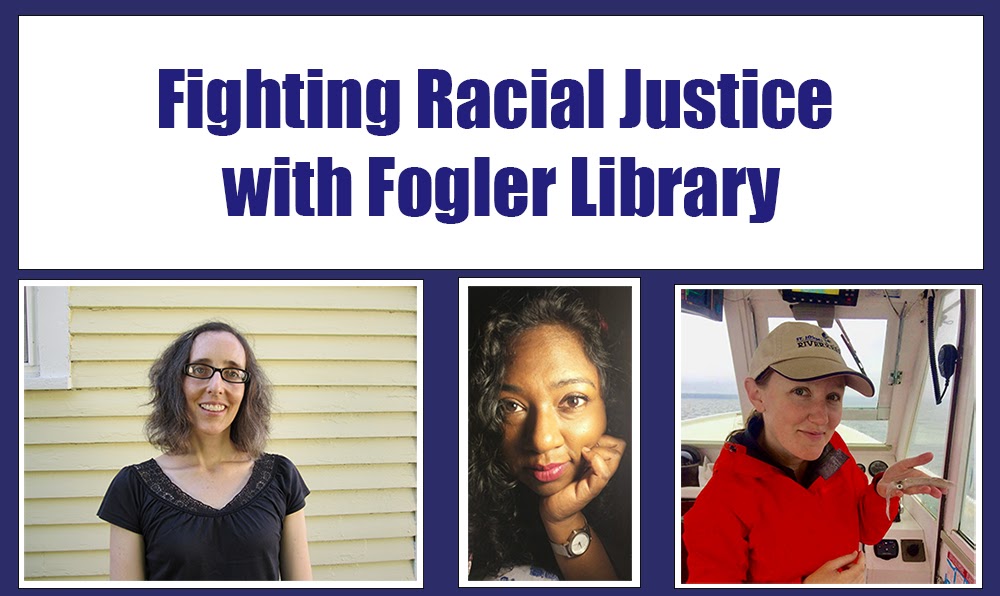Jen Bonnet, Madelyn Woods and Anila Karunakar co-designed Fogler Library’s Racial Justice Challenge, one resource of many for celebrating Black History Month at the University of Maine. Bonnet is a social sciences and humanities librarian at the Fogler Library on campus, Woods is a Ph.D. student in earth and climate sciences and Karunakar serves as the director of the Office for Diversity and Inclusion. The Racial Justice Challenge first launched in August of this past summer.
“With the tragic deaths of George Floyd, Breonna Taylor, Tony McDade, Rayshard Brooks and other BIPOC (Black, Indigenous and People of Color) at the hands of police officers, we recognized that we were witnessing unprecedented numbers of people from all walks of life join the longstanding efforts by BIPOC to address and dismantle systemic racism in this country,” Bonnet explained.
The goal, according to Bonnet, was to create a program that allowed as many people as possible to participate and commit to this work. The three went on to then create the Racial Justice Challenge.
“[The program] is an asynchronous, online program open to anyone willing to and interested in doing this work,” Bonnet said.
What’s great about the challenge is that students aren’t the only ones in the community who can participate. Students, faculty and staff on campus, as well as anyone with an internet connection and an email address, can participate in the program.
An important fact to note about the Racial Justice Challenge is that it is a “self-paced program,” which remains online. This means that those who participate can engage with the material on their own time and at their own pace rather than requiring people to make a time and date commitment each week.
The Racial Justice Challenge spans over five days. “Each day of the Challenge is comprised of several tasks designed to identify, unlearn, and undo systemic racism,” the website explains, which can be found here. The tasks present participants with a range of educational material and actions to take where they are invited to share their own insights and ideas so that everyone can learn from one another. Although this program functions in a remote capacity in order to keep everyone’s health a priority, participants are able to collaborate with one another.
Here is a brief overview of the work that the challenge provides its participants. The goal of the first day focuses on beginning the conversation about racial justice. The key is that students are able to identify where they are “in their own anti-racist journey.” Day Two emphasizes the work of Ibram X Kendi regarding actionable approaches to being anti-racist, versus “not racist.” Day Three urges students to move beyond “the danger of a single story, in order to mitigate racist stereotypes and develop a more nuanced (and celebratory) understanding of BIPOC.” Day Four brings about the awareness of the media. Essentially, Day Four aims to “help participants identify ways to be critical and thoughtful consumers of media.” Day Five requires participants to create a personal anti-racism action plan. The goal of Day Five is to enforce the truth that anti-racism is a long-term commitment.
What’s astonishing to hear is the fact that “over 3000 people have signed up, including folks from the University of Maine, from the greater Maine community, from states across the nation, and even from some international locations,” Bonnet said. Given that February is Black History Month, the three co-designers are encouraging the campus community to visit (or revisit) the challenge, and to commit to doing this work.
Karunakar and her staff in the Office for Diversity and Inclusion, have coordinated and designed a slate of programs for Black History Month. In a UMaine News article, the University of Maine provided a list of Black History Month related events.
Additionally, the Black Student Union has planned a list of events. On Feb. 20, the Husson African Student Association is hosting Culture Night where diversity through performance art will be celebrated. Additionally, the Speaking LIFE Panel is being held on Feb. 22. The Speaking LIFE Panel is an interactive discussion with undergraduates, graduates and alumni from the University of Maine. For more information on upcoming news and events, visit https://umaine.edu/diversity-and-inclusion/.










